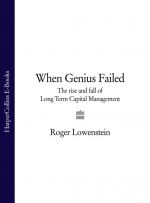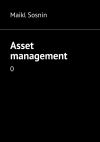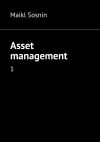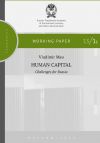Правообладателям!
Представленный фрагмент книги размещен по согласованию с распространителем легального контента ООО "ЛитРес" (не более 20% исходного текста). Если вы считаете, что размещение материала нарушает ваши или чьи-либо права, то сообщите нам об этом.Читателям!
Оплатили, но не знаете что делать дальше?
Текст бизнес-книги "When Genius Failed: The Rise and Fall of Long Term Capital Management"
Автор книги: Roger Lowenstein
Раздел: Жанр неизвестен
Текущая страница: 2 (всего у книги 3 страниц)
It was a pity that the book emphasized a supposed incident in which Meriwether allegedly dared Gutfreund to play a single hand of poker for $10 million, not merely because the story seems apocryphal, but because it canonized Meriwether for a recklessness that wasn’t his.5 Meriwether was the priest of the calculated gamble. He was cautious to a fault; he gave away nothing of himself. His background, his family, his entire past were as much of a blank to colleagues as if, one said, he had “drawn a line in the sand.” He was so intensely private that even when the Long-Term Capital affair was front-page news, a New York Times writer, after trying to determine if Meriwether had any siblings, settled for citing the inaccurate opinion of friends who thought him an only child.6 Such reticence was a perfect attribute for a trader, but it was not enough. What Meriwether lacked, he must have sensed, was an edge—some special forte like the one he had developed on the links in high school, something that would distinguish Salomon from every other bond trader.
His solution was deceptively simple: Why not hire traders who were smarter? Traders who would treat markets as an intellectual discipline, as opposed to the folkloric, unscientific Neanderthals who traded from their bellies? Academia was teeming with nerdy mathematicians who had been publishing unintelligible dissertations on markets for years. Wall Street had started to hire them, but only for research, where they’d be out of harm’s way. On Wall Street, the eggheads were stigmatized as “quants,” unfit for the man’s game of trading. Craig Coats, Jr., head of government-bond trading at Salomon, was a type typical of trading floors: tall, likable, handsome, bound to get along with clients. Sure, he had been a goof-off in college, but he had played forward on the basketball team, and he had trading in his heart. It was just this element of passion that Meriwether wanted to eliminate; he preferred the cool discipline of scholars, with their rigorous and highly quantitative approach to markets.
Most Wall Street executives were mystified by the academic world, but Meriwether, a math teacher with an M.B.A. from Chicago, was comfortable with it. That would be his edge. In 1983, Meriwether called Eric Rosenfeld, a sweet-natured MIT-trained Harvard Business School assistant professor, to see if Rosenfeld could recommend any of his students. The son of a modestly successful Concord, Massachusetts, money manager, Rosenfeld was a computer freak who had already been using quantitative methods to make investments. At Harvard, he was struggling.7 Laconic and dry, Rosenfeld was compellingly bright, but he was less than commanding in a classroom. At a distance, he looked like a thin, bespectacled mouse. The students were tough on him; “they beat the shit out of him,” according to a future colleague. Rosenfeld, who was grading exams when Meriwether called and was making, as he recalled, roughly $30,000 a year, instantly offered to audition for Salomon himself. Ten days later, he was hired.8
Meriwether didn’t stop there. After Rosenfeld, he hired Victor J. Haghani, an Iranian American with a master’s degree in finance from the London School of Economics; Gregory Hawkins, an Arkansan who had helped run Bill Clinton’s campaign for state attorney general and had then gotten a Ph.D. in financial economics from MIT; and William Krasker, an intense, mathematically minded economist with a Ph.D. from—once again—MIT and a colleague of Rosenfeld at Harvard. Probably the nerdiest, and surely the smartest, was Lawrence Hilibrand, who had two degrees from MIT. Hilibrand was hired by Salomon’s research department, the traditional home of quants, but Meriwether quickly moved him into the Arbitrage Group, which, of course, was the heart of the future Long-Term Capital.
The eggheads immediately took to Wall Street. They downloaded into their computers all of the past bond prices they could get their hands on. They distilled the bonds’ historical relationships, and they modeled how these prices should behave in the future. And then, when a market price somewhere, somehow got out of line, the computer models told them.
The models didn’t order them to trade; they provided a contextual argument for the human computers to consider. They simplified a complicated world. Maybe the yield on two-year Treasury notes was a bit closer than it ordinarily was to the yield on ten-year bonds; or maybe the spread between the two was unusually narrow, compared with a similar spread for some other country’s paper. The models condensed the markets into a pointed inquiry. As one of the group said, “Given the state of things around the world—the shape of yield curves, volatilities, interest rates—are the financial markets making statements that are inconsistent with each other?” This is how they talked, and this is how they thought. Every price was a “statement”; if two statements were in conflict, there might be an opportunity for arbitrage.
The whole experiment would surely have failed, except for two happy circumstances. First, the professors were smart. They stuck to their knitting, and opportunities were plentiful, especially in newer markets such as derivatives. The professors spoke of opportunities as inefficiencies; in a perfectly efficient market, in which all prices were correct, no one would have anything to trade. Since the markets they traded in were still evolving, though, prices were often incorrect and there were opportunities aplenty. Moreover, the professors brought to the job an abiding credo, learned from academia, that over time, all markets tend to get more efficient.
In particular, they believed, spreads between riskier and less risky bonds would tend to narrow. This followed logically because spreads reflect, in part, the uncertainty that is attached to chancier assets. Over time, if markets did become more efficient, such riskier bonds would be less volatile and therefore more certain-seeming, and so the premium demanded by investors would tend to shrink. In the early 1980s, for instance, the spreads on swaps—a type of derivative trade, of which more later—were 2 percentage points. “They looked at this and said, ‘It can’t be right; there can’t be that much risk,’” a junior member of Arbitrage recalled. “They said, ‘There is going to be a secular trend toward a more efficient market.’”
And swap spreads did tighten—to 1 percentage point and eventually to a quarter point. All of Wall Street did this trade, including the Salomon government desk, run by the increasingly wary Coats. The difference was that Meriwether’s Arbitrage Group did it in very big dollars. If a trade went against them, the arbitrageurs, especially the ever-confident Hilibrand, merely redoubled the bet. Backed by their models, they felt more certain than others did—almost invincible. Given enough time, given enough capital, the young geniuses from academe felt they could do no wrong, and Meriwether, who regularly journeyed to academic conferences to recruit such talent, began to believe that the geniuses were right.
That was the second happy circumstance: the professors had a protector who shielded them from company politics and got them the capital to trade. But for Meriwether, the experiment couldn’t have worked; the professors were simply too out of place. Hilibrand, an engineer’s son from Cherry Hill, New Jersey, was like an academic version of Al Gore; socially awkward, he answered the simplest-seeming questions with wooden and technical—albeit mathematically precise—replies. Once, a trader not in the Arbitrage Group tried to talk Hilibrand out of buying and selling a certain pair of securities. Hilibrand replied, as if conducting a tutorial, “But they are priced so egregiously.” His colleague, accustomed to the profane banter of the trading floor, shot back, “I was thinking the same thing—‘egregiously’!” Surrounded by unruly traders, the arbitrageurs were quiet intellectuals. Krasker, the cautious professor who built many of the group’s models, had all the charisma of a tabletop. Rosenfeld had a wry sense of humor, but in a firm in which many of the partners hadn’t gone to college, much less graduate school at MIT, he was shy and taciturn.
Meriwether had the particular genius to bring this group to Wall Street—a move that Salomon’s competitors would later imitate. “He took a bunch of guys who in the corporate world were considered freaks,” noted Jay Higgins, then an investment banker at Salomon. “Those guys would be playing with their slide rules at Bell Labs if it wasn’t for John, and they knew it.”9
The professors were brilliant at reducing a trade to pluses and minuses; they could strip a ham sandwich to its component risks; but they could barely carry on a normal conversation. Meriwether created a safe, self-contained place for them to develop their skills; he adoringly made Arbitrage into a world apart. Because of Meriwether, the traders fraternized with one another, and they didn’t feel the need to fraternize with anyone else.
Meriwether would say, “We’re playing golf on Sunday,” and he didn’t have to add, “I’d like you to be there.” The traders who hadn’t played golf before, such as Hilibrand and Rosenfeld, quickly learned. Meriwether also developed a passion for horses and acquired some thoroughbreds; naturally, he took his traders to the track, too. He even shepherded the gang and their spouses to Antigua every year. He didn’t want them just during trading hours, he wanted all of them, all the time. He nurtured his traders, all the while building a protective fence around the group as sturdy as the red board fence in Rosemoor.
Typical of Meriwether, he made gambling an intimate part of the group’s shared life. The arbitrageurs devised elaborate betting pools over golf weekends; they bet on horses; they took day trips to Atlantic City together. They bet on elections. They bet on anything that aroused their passion for odds. When they talked sports, it wasn’t about the game; it was about the point spread.
Meriwether loved for his traders to play liar’s poker, a game that involves making poker hands from the serial numbers on dollar bills. He liked to test his traders; he thought the game honed their instincts, and he would get churlish and threaten to quit when they played poorly. It started as fun, but then it got serious; the traders would play for hours, occasionally for stakes in the tens of thousands of dollars. Rosenfeld kept an envelope stuffed with hundreds of single bills in his desk. Then, when it seemed that certain bills were cropping up too often, they did away with bills and got a computer to generate random lists of numbers. The Arbitrage boys seemed addicted to gambling: “You could never go out to dinner with J.M.’s guys without playing liar’s poker to see who would pick up the check,” Gerald Rosenfeld, Salomon’s chief financial officer, recalled. Meriwether was a good player, and so was Eric Rosenfeld (no relation), who had an inscrutable poker face. The straight-arrow Hilibrand was a bit too literal. He was incapable of lying and for a long time never bluffed; mustachioed and eerily intelligent, he had a detachment that was almost extrahuman. Once, when asked whether it was awkward to have a wife who worked in mortgages (which Hilibrand traded), he answered flatly, “Well, I never talk to my wife about business.”
The Arbitrage Group, about twelve in all, became incredibly close. They sat in a double row of desks in the middle of Salomon’s raucous trading floor, which was the model for the investment bank in Tom Wolfe’s The Bonfire of the Vanities. Randy Hiller, a mortgage trader in Arbitrage, found its cliquish aspect overbearing and left. Another defector was treated like a traitor; Meriwether vengefully ordered the crew not to even golf with him. But very few traders left, and those who remained all but worshiped Meriwether. They spoke of him in hushed tones, as of a Moses who had brought their tribe to Palestine. Meriwether didn’t exactly return the praise, but he gave them something more worthwhile. His interest and curiosity stimulated the professors; it challenged them and made them better. And he rewarded them with heartfelt loyalty. He never screamed, but it wouldn’t have mattered if he had. To the traders, the two initials “J.M.”—for that was his unfailing sobriquet—were as powerful as any two letters could be.
Though he had a private office upstairs, Meriwether usually sat on the trading floor, at a tiny desk squeezed in with the others. He would chain-smoke while doing Eurodollar trades, and supervise the professors by asking probing questions. Somehow, he sheathed great ambition in an affecting modesty. He liked to say that he never hired anyone who wasn’t smarter than he was. He didn’t talk about himself, but no one noticed because he was genuinely interested in what the others were doing. He didn’t build the models, but he grasped what the models were saying. And he trusted the models because his guys had built them. One time, a trader named Andy who was losing money on a mortgage trade asked for permission to double up, and J.M. gave it rather offhandedly. “Don’t you want to know more about this trade?” Andy asked. Meriwether’s trusting reply deeply affected the trader. J.M. said, “My trade was when I hired you.”
Meriwether had married Mimi Murray, a serious equestrian from California, in 1981, and the two of them lived in a modest two-bedroom apartment on York Avenue on the Upper East Side. They wanted children, according to a colleague, but remained childless.
Aside from Mimi, J.M.’s family was Salomon. He didn’t leave his desk even for lunch; in fact, his noontime was as routinized as the professors’ models. Salomon did a china-service lunch, and for a long time, every day, a waiter would waft over to Meriwether bearing a bologna sandwich on white bread, two apples, and a Tab hidden under a silver dome. J.M. would eat one of the apples and randomly offer the other to one of the troops as a sort of token. The rest of the gang might order Chinese food, and if any sauce leaked onto his desk, J.M., his precious territory violated, would scowl and say, “Look, I guess I’m going to have to give up my desk and go back to my office and work there.”
A misfit among Wall Street’s Waspish bankers, J.M. identified more with the parochial school boys he had grown up with than with the rich executives whose number he had joined. Unlike other financiers in the roaring eighties, who were fast becoming trendy habitués of the social pages, Meriwether disdained attention (he purged his picture from Salomon’s annual report) and refused to dine on any food that smacked of French. When in Tokyo, he went to McDonald’s. Ever an outsider, he molded his group into a tribe of outsiders as cohesive, loyal, and protective as the world he had left in Rosemoor. His cohorts were known by schoolboy nicknames such as Vic, the Sheik, E.R., and Hawk.
Although J.M. knew his markets, his reputation as a trader was overwrought. His real skill was in shaping people, which he did in singularly understated style. He was awkward when speaking to a group; his words came out in uneven bunches, leaving others to piece together their meaning.10 But his confidence in his troops was written on his face, and it worked on their spirits like a tonic. Combined with the traders’ uncommon self-confidence, Meriwether’s faith in them was a potent but potentially combustible mix. It inflated their already supreme self-assurance. Moreover, J.M.’s willingness to bankroll Hilibrand and the others with Salomon’s capital dangerously conditioned the troops to think that they would always have access to more.
As Arbitrage made more money, the group’s turf inevitably expanded. Meriwether, eclipsing rivals such as Coats, gained command over all bond trading, including government bonds, mortgages, high-yield corporate bonds, European bonds, and Japanese warrants. It seemed logical, for the group to apply its models in new and greener pastures. But others in Salomon began to seethe. J.M. would send one of his boys—Hilibrand or Victor Haghani—to Salomon’s London office or its Tokyo office, and the emissary would declare, “This trade is very good, but you should be ten times bigger in it.” Not two times, but ten times! As if they couldn’t fail. Hilibrand and Haghani were in their twenties, and they might be talking to guys twice their age. Then they started to say, “Don’t do this trade; we’re better at this than anyone else, so we’ll do all of this trade on the arbitrage desk.”
Hilibrand was particularly annoying. He was formal and polite, but he struck old hands as condescending, infuriating them with his mathematical certitude. One time, he tried to persuade some commodity traders that they should bet on oil prices following a pattern similar to that of bond prices. The traders listened dubiously while Hilibrand bobbed his head back and forth. Suddenly he raised a hand and sonorously declaimed, “Consider the following hypothesis.” It was as if he were delivering an edict from on high, to be etched in stone.
Traders had an anxious life; they’d spend the day shouting into a phone, hollering across the room, and nervously eyeballing a computer screen. The Arbitrage Group, right in the middle of this controlled pandemonium, seemed to be a mysterious, privileged subculture. Half the time, the boys were discussing trades in obscure, esoteric language, as if in a seminar; the other half, they were laughing and playing liar’s poker. In their cheap suits and with their leisurely mien, they could seemingly cherry-pick the best trades while everyone else worked at a frenetic pace.
The group was extremely private; it seemed to have adopted J.M.’s innate secretiveness as a protective coloring. Though any trader is well advised to be discreet, the professors’ refusal to share any information with their Salomon colleagues fueled the resentment felt by Coats and others. Though Arbitrage soaked up all of the valuable tidbits that passed through a premier bond-trading floor, it set up its own private research arm and strictly forbade others in Salomon to learn about its trades. One time, the rival Prudential-Bache hired away a Salomon mortgage trader, which was considered a coup. “What was the first thing he wanted?” a then-Pru-Bache manager laughingly remembered. “Analytics? Better computer system or software? No. He wanted locks on the filing cabinet. It reflected their mentality!” Driven by fanatical loyalty to Meriwether, the Arbitrage Group nurtured an us-against-them clannishness that would leave the future Long-Term dangerously remote from the rest of Wall Street. Hilibrand became so obsessed with his privacy that he even refused to let Salomon Brothers take his picture.11
As other areas of Salomon floundered, Arbitrage increasingly threw its weight around. Hilibrand pressed the firm to eliminate investment banking, which, he argued with some justification, took home too much in bonuses and was failing to carry its weight. Then he declared that Arbitrage shouldn’t have to pay for its share of the company cafeteria, because the group didn’t eat there. True to his right-wing, libertarian principles, Hilibrand complained about being saddled with “monopoly vendors,” as if every trader and every clerk should negotiate his own deal for lunch. The deeper truth was that Hilibrand and his mates in Arbitrage had little respect for their mostly older Salomon colleagues who worked in other areas of the firm. “It was like they were a capsule inside a spaceship,” Higgins said of J.M.’s underlings. “They didn’t breathe the air that everybody else did.”
Hilibrand and Rosenfeld continually pressed J.M. for more money. They viewed Salomon’s compensation arrangement, which liberally spread the wealth to all departments, as socialistic. Since Arbitrage was making most of the money, they felt, they and they alone should reap the rewards.
In 1987, the raider Ronald Perelman made a hostile bid for Salomon. Gutfreund feared, with ample justification, that if Perelman won, Salomon’s reputation as a trusted banker would go down the tubes (indeed, Salomon’s corporate clients could likely find themselves on Perelman’s hit list). Gutfreund fended Perelman off by selling control of the firm to a distinctly friendly investor, the billionaire Warren Buffett. Hilibrand, who weighed everything in mathematical terms, was incensed over what he reckoned was a poor deal for Salomon. The twenty-seven-year-old Wunderkind, though unswervingly honest himself, couldn’t see that an intangible such as Salomon’s ethical image was also worth a price. He actually flew out to Omaha to try to persuade Buffett, now a member of Salomon’s board, to sell back his investment, but Buffett, of course, refused.
J.M. tried to temper his impatient young Turks and imbue them with loyalty to the greater firm. When the traders’ protests got louder, J.M. invited Hilibrand and Rosenfeld to a dinner with William McIntosh, an older partner, to hear about Salomon’s history. A liberal Democrat in the Irish Catholic tradition, J.M. had a stronger sense of the firm’s common welfare and a grace that softened the hard edge of his cutthroat profession. He shrugged off his lieutenants’ occasional cries that Arbitrage should separate from Salomon. He would tell them, “I’ve got loyalty to people here. And anyway, you’re being greedy. Look at the people in Harlem.” He pressed Salomon to clean house, but not without showing concern for other departments. Thoughtfully, when the need arose, he would tell the chief financial officer, “We have a big trade on; we could lose a lot—I just want you to know.” In the crash of 1987, Arbitrage did drop $120 million in one day.12 Others at Salomon weren’t sure quite what the group was doing or what its leverage was, but they instinctively trusted Meriwether. Even his rivals in the firm liked him. And then it all came crashing down.
Pressed by his young traders, who simply wouldn’t give up, in 1989 Meriwether persuaded Gutfreund to adopt a formula under which his arbitrageurs would get paid a fixed, 15 percent share of the group’s profits. The deal was cut in secret, after Hilibrand had threatened to bolt.13 Typically, J.M. left himself out of the arrangement, telling Gutfreund to pay him whatever he thought was fair. Then Arbitrage had a banner year, and Hilibrand, who got the biggest share, took home a phenomenal $23 million. Although Hilibrand modestly continued to ride the train to work and drive a Lexus, news of his pay brought to the surface long-simmering resentments, particularly as no other Salomon department was paid under such a formula. As Charlie Munger, Buffett’s partner and a Salomon director, put it, “The more hyperthyroid at Salomon went stark, raving mad.”
In particular, a thirty-four-year-old trader named Paul Mozer was enraged. Mozer had been part of Arbitrage, but a couple of years earlier he had been forced to leave that lucrative area to run the government desk. Mozer had a wiry frame, close-set eyes, and an intense manner. In 1991, a year after the storm over Hilibrand’s pay, Mozer went to Meriwether and made a startling confession: he had submitted a false bid to the U.S. Treasury to gain an unauthorized share of a government-bond auction.
Stunned, Meriwether asked, “Is there anything else?” Mozer said there wasn’t.
Meriwether took the matter to Gutfreund. The pair, along with two other top executives, agreed that the matter was serious, but they somehow did nothing about it. Although upset with Mozer, Meriwether stayed loyal to him. It is hard to imagine the clannish, faithful J.M. doing otherwise. He defended Mozer as a hard worker who had slipped but once and left him in charge of the government desk. This was a mistake—not an ethical mistake but an error in judgment brought on by J.M.’s singular code of allegiance. In fact, Mozer was a volatile trader who—motivated more by pique than by a realistic hope for profit—had repeatedly and recklessly broken the rules, jeopardizing the reputation of Meriwether, his supervisor, and the entire firm. It must be said that Mozer’s crime had been so foolish as to be easily slipped by his superiors. Quite naturally, Meriwether, now head of Salomon’s bond business, hadn’t thought to inquire if one of his traders had been lying to the U.S. Treasury. But J.M.’s lenience after the fact is hard to fathom. A few months later, in August, Salomon discovered that Mozer’s confession to Meriwether had itself been a lie, for he had committed numerous other infractions, too. Though now Salomon did report the matter, the Treasury and Fed were furious. The scandal set off an uproar seemingly out of proportion to the modest wrongdoing that had inspired it.14 No matter; one simply did not—could not—deceive the U.S. Treasury. Gutfreund, a lion of Wall Street, was forced to quit.
Buffett flew in from Omaha and became the new, though interim, CEO. He immediately asked the frazzled Salomon executives, “Is there any way we can save J.M.?” Meriwether, of course, was the firm’s top moneymaker and known as impeccably ethical. His traders heatedly defended him, pointing out that J.M. had immediately reported the matter to his superior. But pressure mounted on all involved in the scandal. McIntosh, the partner who had first brought Meriwether into Salomon, trekked up to J.M.’s forty-second-floor office and told him that he should quit for the good of the firm. And almost before the Arbitrage Group could fathom it, their chief had resigned. It was so unexpected, Meriwether felt it was surreal; moreover, he suffered for being front-page news. “I’m a fairly shy, introspective person,” he later noted to Business Week.15 The full truth was more bitter: J.M. was being pushed aside—even implicitly blamed—despite, in his opinion, having done no wrong. This painful dollop of limelight made him even more secretive, to Long-Term Capital’s later regret. Meanwhile, within the Arbitrage Group, resurrecting J.M. became a crusade. Hilibrand and Rosenfeld kept J.M.’s office intact, with his golf club, desk, and computer, as if he were merely on an extended holiday. Deryck Maughan, the new CEO, astutely surmised that as long as this shrine to J.M. remained, J.M. was alive as his potential rival. Sure enough, a year later, when Meriwether resolved his legal issues stemming from the Mozer affair, Hilibrand and Rosenfeld, now the heads of Arbitrage and the government desk, respectively, lobbied for J.M.’s return as co-CEO.*
Maughan, a bureaucrat, was too smart to go for this and tried to refashion Salomon into a global, full-service bank, with Arbitrage as a mere department. Hilibrand, who was dead opposed to this course, increasingly asserted himself in J.M.’s absence. He wanted Salomon to fire its investment bankers and retrench around Arbitrage. Meanwhile, he made a near-catastrophic bet in mortgages and fell behind by $400 million. Most traders in that situation would have called it a day, but Hilibrand was just warming up; he coolly proposed that Salomon double its commitment! Because Hilibrand believed in his trade so devoutly, he could take pain as no other trader could. He said that the market was like a Slinky out of shape—eventually it would spring back. It was said that only once had he ever suffered a permanent loss, a testament to the fact that he was not a gambler. But his supreme conviction in his own Tightness cried out for some restraining influence, lest it develop a reckless edge.
Doubling up was too much, but management let Hilibrand keep the trade he had. Eventually, it was profitable, but it reminded Salomon’s managers that while Hilibrand was critiquing various departments as being so much extra baggage, Arbitrage felt free to call on Salomon’s capital whenever it was down. The executives could never agree on just how much capital Arbitrage was tying up or how much risk its trades entailed, matters on which the dogmatic Hilibrand lectured them for hours. In short, how much—if, sometime, the Slinky did not bounce back—could Arbitrage potentially lose? Neither Buffett nor Munger ever felt quite comfortable with the mathematical tenor of Hilibrand’s replies.16 Buffett agreed to take J.M. back—but not, as Hilibrand wanted, to trust him with the entire firm.
Of course, there was no way Meriwether would settle for such a qualified homecoming. The Mozer scandal had ended any hope that J.M. would take his place at the top of Salomon, but it had sown the seeds of a greater drama. Now forty-five, with hair that dipped in a wavy, boyish arc toward impenetrable eyes, J.M. broke off talks with Salomon. He laid plans for a new and independent arbitrage fund, perhaps a hedge fund, and he proceeded to raid the Arbitrage Group that he had, so lovingly, assembled.
* In practical terms, those who go short sell a security they have borrowed. They must return the security later—by which time, they believe, the price will have declined. The principle of buying cheap and selling dear still holds. Short sellers merely reverse the order: sell dear, then buy cheap.
* The Securities and Exchange Commission filed a civil complaint charging that Meriwether had failed to properly supervise Mozer. Without admitting or denying guilt, Meriwether settled the case, agreeing to a three-month suspension from the securities industry and a $50,000 fine.
Правообладателям!
Представленный фрагмент книги размещен по согласованию с распространителем легального контента ООО "ЛитРес" (не более 20% исходного текста). Если вы считаете, что размещение материала нарушает ваши или чьи-либо права, то сообщите нам об этом.Читателям!
Оплатили, но не знаете что делать дальше?







